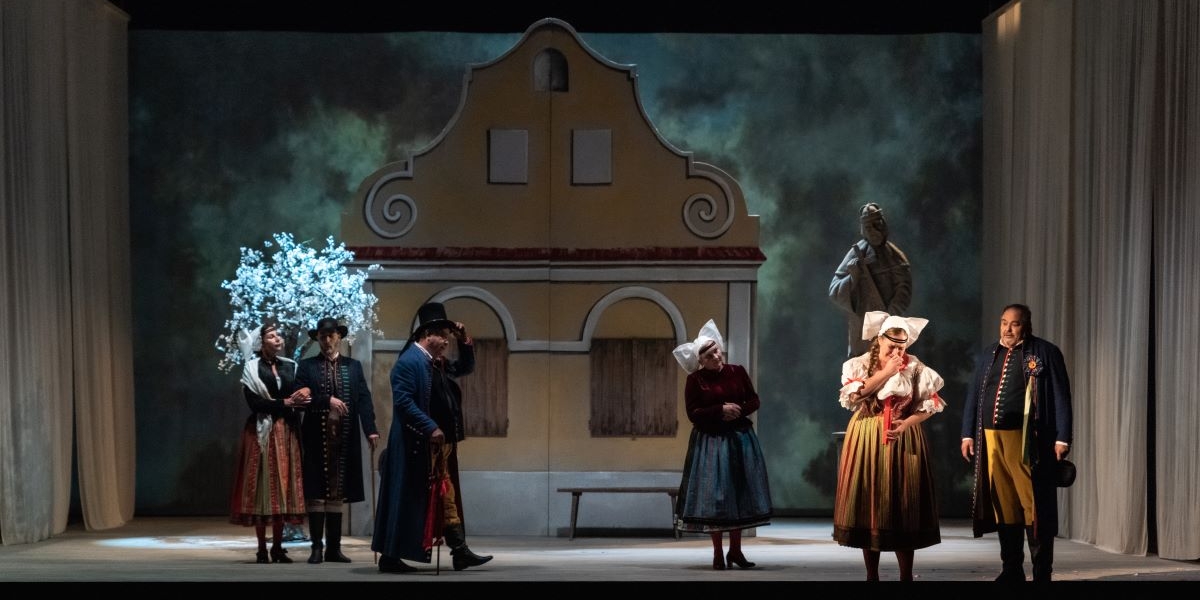Smetana is known as the ‘father of Czech opera’; he spent five years in Sweden, where, stung by the comment that Czechs were incapable of making music of their own, Smetana determined to create a wholly Czech operatic genre. This three-act comedy is Smetana’s second opera. He used Bohemian melodies and dance songs, and was for many years the only Czech opera in the repertoire abroad, originally sung in German. After major revision, the original dialogue disappeared. It has been described as ‘a work of human felicity’. It is full of joy and in the permanent repertoire of all Czech opera companies. The opening chorus ‘proĉ bychom se netélŝi is part of Czech folklore.
Smetana was the Lloyd-Webber of his day, immensely popular due to his sweeping melodies and singable tunes. His personal life, on the other hand, was quite tragic. His first wife and three of his children died of TB and scarlet fever: Smetana himself was deaf for the last 10 years of his life.
For over 150 years Bartered Bride has dominated Czech opera; it is in the national DNA. Smetana set Bartered Bride in Plzeň as a fond memory of his youth, so where better to see it? The music is full of joy, foot tapping melodies and dances, such as the Polka and Furiant, the Beer Chorus ‘to piveĉko to veřu je nebeský dar’. There are also heartfelt love arias – ‘Jak mozňa věřit’ for Jenik: Mařenka’s pain when she thinks she has been sold – ‘Ó jaký žal’: foot-tapping duets ‘Tak tvrdoŝojina, divko, jsi.’ And finally, the spectacular circus scenes.
It is the perfect starter opera for all ages.
This is a new production and the first production put on after the Corona pandemic closed the theatre. This production is intentionally set in the time when Smetana studied in Plzeň. The costumes are authentic for the period, dancers fill the stage for the regionally choreographed folk dances. There is both an adult and children’s choir, which is a perfect way to have children involved in the arts. It is colourful and full of action.
Bartered Bride is a fun piece set in the country about a scheming marriage broker, two couples who want to marry off their children, but true love prevails and all ends happily.
This performance had been sold out for months, and was a shortened version for schools. It was packed with well-dressed excited school children. A young girl appears onstage in the circus scenes dressed in a tutu, and dances. The children were entranced. This is the next generation of opera singers, dancers and opera-lovers.
Czech soprano Ivana Veberová made her breakthrough debut in Plzeň as Mařenka 17 years ago; she lives and breathes Mařenka. She won the coveted Thalia award in 2014. She sings this with charm and ease, but as she now sings heavy dramatic roles such as Abigaille and Armida, the voice is beginning to be too heavy. Mařenska should look and sound younger than her stage parents. Some top notes were not working properly, probably due to having sung the dramatic soprano title role in Dvořak’s Armida the night before; at 11am, there is insufficient time for the voice to recover.
Czech tenor Richard Samek’s Jeník is a quality singer; he makes ‘jak možno veřĩt’ sounds easy; the ascending phrases and top notes were spot on; he is a joy to watch.
Czech/German Jan Ondřaĉek as stuttering Vaŝek is a delight.
Ukranian bass, Jevhen Ŝokalo, as Kecal, also sang in Armida the previous evening. The bottom and middle register are good, but the top register sounds pushed and stops spinning.
Czech soprano Radka Sehnoutkovà’s Esmeralda was suitably sexy and provocative.
Unfortunately, as this was a shortened version for schools, some music was cut. I would love to see the full version, as this was a joy from start to finish.
Plzeň is on the tourist map for the beer; an hour from Prague, it is easily accessible, and a lovely town. People should visit the beautiful Tyl theatre Plzeň as well, and, of course, the opera!

